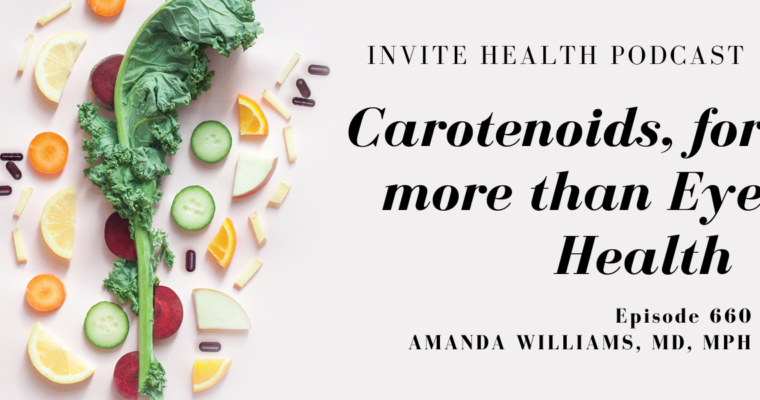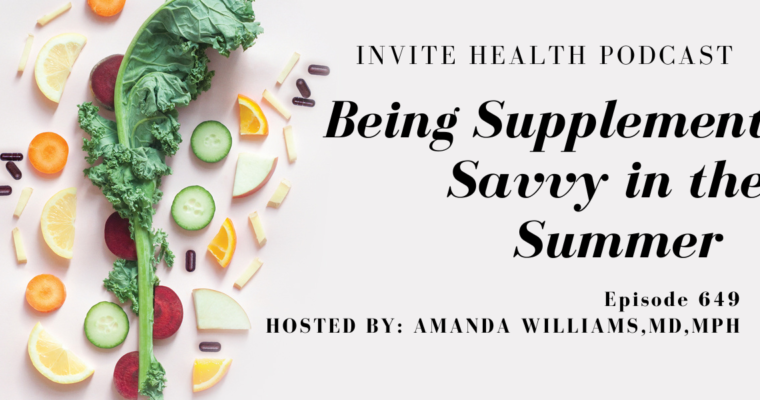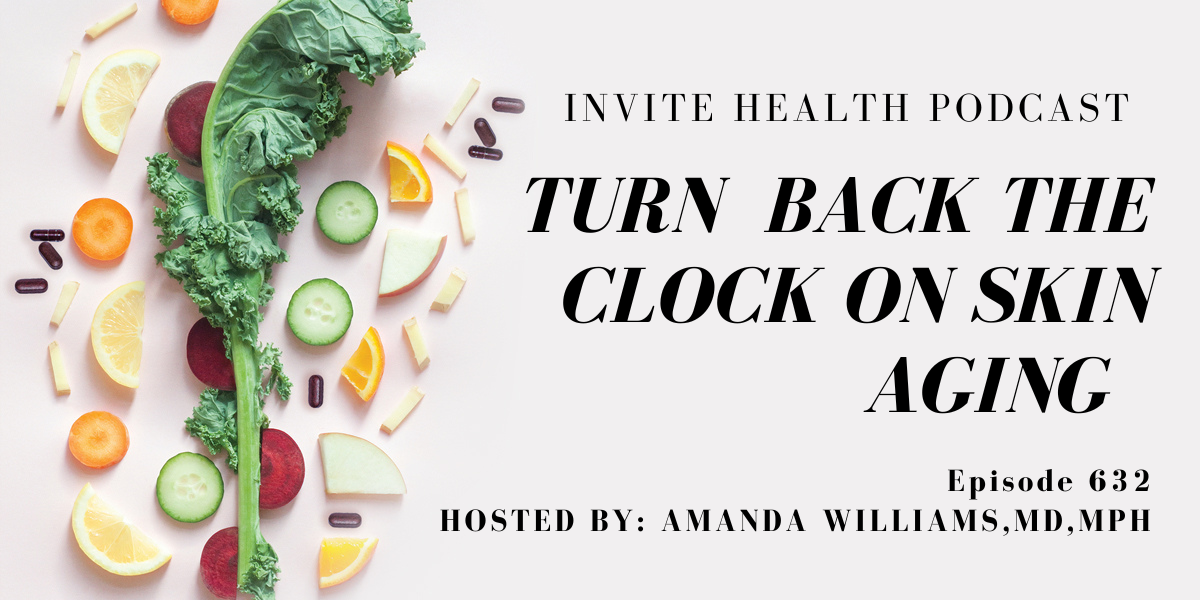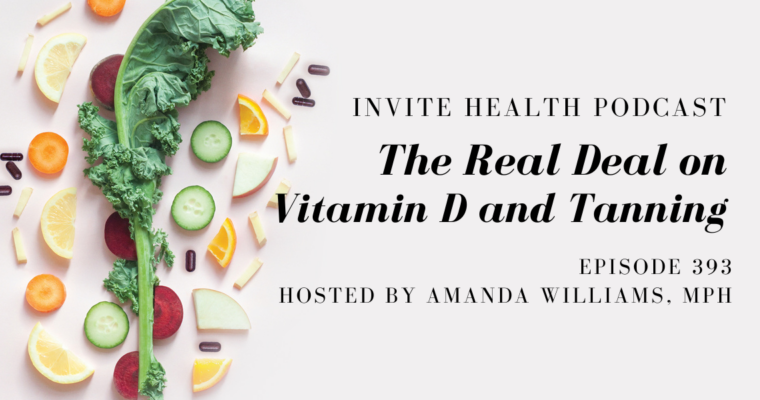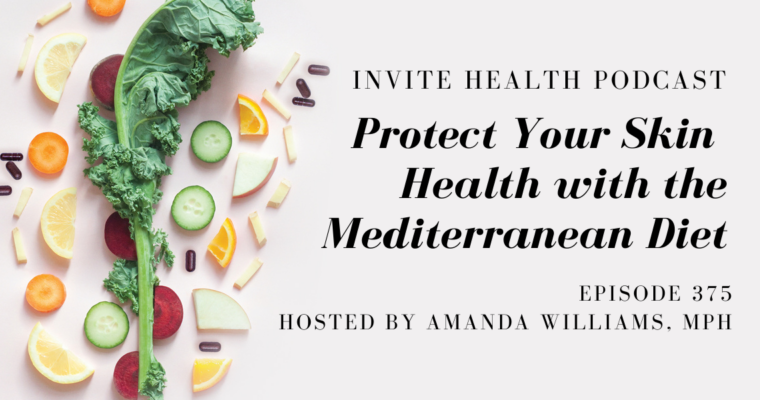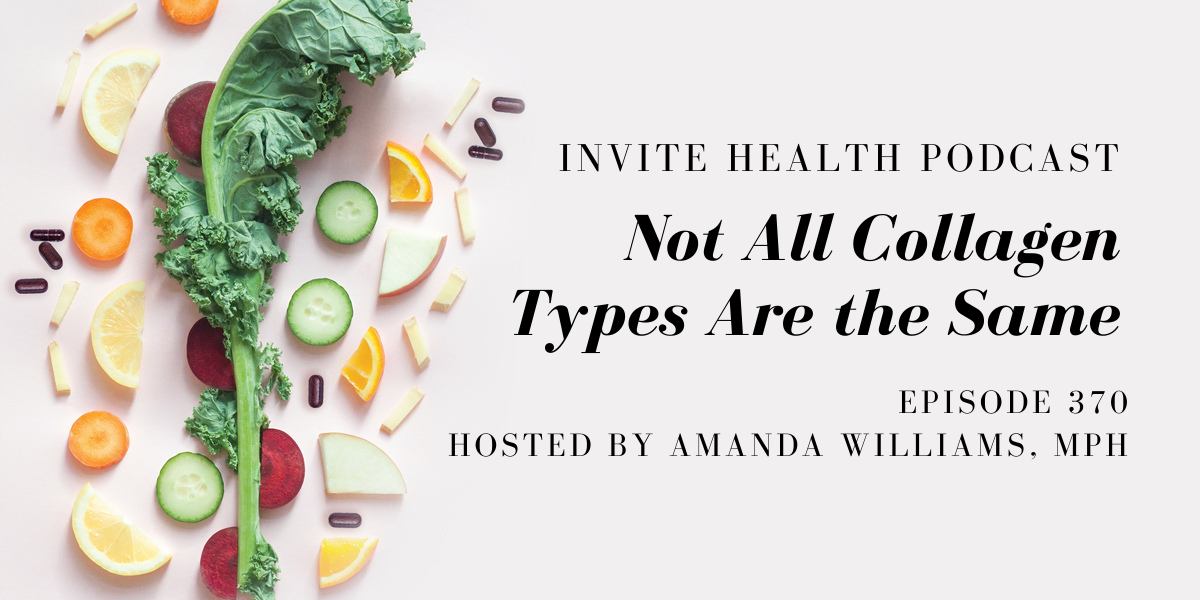Subscribe Today!
Please see below for a complete transcript of this episode.
TURN BACK THE CLOCK ON SKING AGING, INVITEⓇ HEALTH PODCAST, EPISODE 632
Hosted by Amanda Williams, MD, MPH

*Intro Music*
InViteⓇ Health Podcast Intro: [00:00:04] Welcome to the InViteⓇ Health Podcast, where our degreed health care professionals are excited to offer you the most important health and wellness information you need to make informed choices about your health. You can learn more about the products discussed in each of these episodes and all that Invite Health has to offer at invitehealth.com/podcast. First time customers can use promo code podcast at checkout for an additional 15% off your first purchase. Let’s get started. † [00:00:34]
*Intro Music*
Amanda Williams MD, MPH: [00:00:40] When it comes to aging, the first place that most people will notice this process occurring is their skin. Yes, folks, the fine lines and wrinkles that everybody dreads. You look in the mirror and you go, what in the world is happening? And we know that there’s many causative reasons to this. But I want to talk about some solutions because we don’t have to just accept it as part of the normal aging process. We know that our skin is our protective barrier to keep us healthy. But there are so many things that our skin is exposed to throughout our life that can be incredibly damaging. And there are ways that we can kind of reverse this. And I want to talk about the science behind all of these things. Today, I am Dr. Amanda Williams, scientific director at Invite Health. And when it comes to skin aging, this is a major complaint for both men and women. And we know a lot of people. It’s not a vanity thing necessarily. This is just a sense of well-being. And when you look at your skin and you notice that you are having more pronounced lines and wrinkles, deep crevices, this can kind of be a daily reminder that we’re getting older and we know that the aging process is something that we can’t avoid, but we can certainly help ourselves along when it comes to combating this. And the health and appearance of our skin really depends on the health of several different structural proteins, collagen, keratin, elastin, all of these things are very, very important, hyaluronic acid. And when we are looking to replenish this, this is when we have to kind of fast track this to make up for lost time. So, the addition of a formulation such as Collagen Hx, which is a hydrolyzed collagen or the Collagex HA, which also contains hydrolyzed collagen, which means it’s going to absorb well into the system so we can replenish the collagen that we start to lose once we hit about 25 years old. So, we want to put that as the main framework for structurally repairing the skin. † [00:02:56]
[00:02:57] But we know that there are a lot of other factors and that we need to zero in on those. How do we help to improve upon the skin’s elasticity, the tone, the texture, as well as if we have damage because of extrinsic factors such as UV exposure, the sun, photo aging, we know this is a real deal problem. We know there’s many biological effects to aging when it comes to hormonal fluctuations. This certainly can drive many of the changes in the quality of your skin. This is generally more pronounced in women because we know that estrogen plays a significant role in maintaining the skin’s elasticity. So as women are going through menopause, it becomes more pronounced when you start to see these effects, negative effects to skin aging itself. We know that air pollution is incredibly damaging to the skin. They have done multiple studies showing that the exposure to these different pollutants over the course of our life can certainly speed up the aging process and the quality of the skin itself. We know that there are problems when it comes to chronic disease states that can affect our aging of the skin, looking at advanced glycation end products, for example. So, if someone is diabetic or pre-diabetic, or insulin resistant, metabolic syndrome, this can create problems when it comes to collagen and elastin, kind of changing and breaking down. So how do we combat this? Well, we have to look at our diet. We have to incorporate in those high antioxidant foods coming from fruits and vegetables. Of course, we want to incorporate in our collagen formulation each and every single day. But then we look at the topical approach and we have a wonderful formulation, our enhanced Vitamin C serum, which is just packed with wonderful nutrients, not only the vitamin C itself, but other wonderful nutrients that have all been studied and shown to be highly beneficial when it comes to reversing those signs of photo aging and aging itself. So let’s first look at the vitamin C. † [00:05:19]
[00:05:20] We know that topical application of vitamin C is critical because it’s so beneficial when it comes to the way that the collagen fibers themselves actually crosslink. And as we grow older, we know we have more and more collagen degradation. So, we’re taking collagen as a supplement. That’s one component. But we also topically want to be able to stabilize those collagen fiber. So not just putting them in, but stabilizing them once they are in. So, we know that vitamin C helps to replenish the collagen. It helps to support and work synergistically with vitamin E to protect against oxidative stress and damage that our skin is exposed to. In the Journal of Clinical and Esthetic Dermatology, they talk about the way in which vitamin C has these very powerful anti-aging effects. In our formulation, we have a 20% vitamin C, which is very, very powerful. So, it’s going to work very quickly when it comes to that repairing mechanism and for the stability of the skin itself. We know that when it comes to the topical application of vitamin C, they have done studies where they can actually show that if they apply vitamin C on one half of the face and then compare that to the other side of the face, which does not have that exposure to vitamin C, that the vitamin C does a wonderful job when it comes to repairing all of that photo damage that occurs throughout our life. So, if you are out in the sun a lot, this can create more extensive problems with the aging process. And when they did this study, this was back in 2002, it was in an Dermatology surgical journal, they could see the significant repair that the vitamin C actually had just from the topical application. Now, interestingly enough, in this study, they were using a 10% vitamin C serum. We have a 20%, so this is double the benefit we can look at compared to the study that was done back over 20 years ago. So, this formulation that we offer with this high amount of vitamin C is working synergistically with the vitamin E that’s contained in it. It has green tea, white tea, polyphenols. We know the power of those tea extracts when it comes to the health of our skin, which is why so often people have turned to the utilization of tea extracts when it comes to benefiting our aging skin. We know that those powerful antioxidants that the teas contain really do a wonderful job at quenching all of those free radicals that the skin is exposed to from those extrinsic factors. We want to think about the air pollutants, when we think about the sun, and this is why we have this as part of our formulation, because topically, the more we can help to repair that damage, the better we do in terms of the recovery mechanism. We also recognize that those tea extracts are very potent inducers of superoxide dismutase, which is a very powerful antioxidant enzyme that also helps to repair the skin itself. And we know that just from the normal aging process, our SOD levels will start to diminish. So, if we can replenish those back in, we are doing a wonderful job in terms of boosting up our antioxidant defenses. † [00:08:58]
SUMMER THE MEDITERRANEAN WAY FOR HEALTHY SKIN – INVITE HEALTH PODCAST, EPISODE 552>>LISTEN NOW!
[00:08:59] Now, here’s another interesting fact. When we look at coenzyme Q10, which is oftentimes looked at and touted as being the cardiac boosting antioxidant, and of course it is, but when we use it topically, such as in our enhanced vitamin C serum, it does a wonderful job once again for targeting that aging effect that occurs throughout our life. The functional loss of the cellular energy is part of the reason why aging can be accelerated. So, the more that the little energy makers of our cells start to kind of lose their ability to properly work, we start to have this negative effect because the cell is no longer going to be efficient. We see this even in the setting of skin cells. So by applying topical coenzyme Q10, we have this very positive influence on repairing that cellular metabolism and helping to combat the signs of aging that start at that cell level. So, with having the vitamin C, the vitamin E in combination with those tea polyphenols, having that coenzyme Q10, and then all of this partnered up with Argan Oil, Ferulic acid, plant based hyaluronic acid, helps with the hydration, the plumping of the skin, and an overall improvement of the tone and texture. So even if we have areas that are hyper-pigmented, maybe we have that sun damaged look to the skin and this can be on the face, can also be on your hands. We know that the skin is very prone to that damaging effect from UV radiation. So, through the addition of the ferulic acid that we have in this formulation, this really helps to offset and combat a lot of those reactive oxygen species that do so much damage when it comes to the health of our skin throughout time. Now, how do you use this formulation? Because it is very powerful, and some folks do have very sensitive skin. So, in that situation, if you do have more of that tendency or if you’re more prone to skin sensitivity, I would advise starting off with this formulation, using it one time per week and see how your skin is reacting to this. If you are doing just fine because this is a very strong vitamin C, then I would increase that to three times per week. For someone who doesn’t have that type of tendency to any type of skin sensitivity, you can go ahead and start off with the three times a week and can you use this every day? I get this question a lot, yes, you certainly can. But it’s a situation where I always encourage you to build up to that because we don’t want to create any type of, you know, unwanted sensitivity because this is very powerful, because we know it’s going to repair all of those damaged skin cells. So, you want to kind of ease your way into it. Oftentimes, people will use this in the evening after cleansing their face. Go ahead and you apply this, this is a serum, so it’s kind of a liquid, more watery and but it absorbs wonderfully into the skin. So, you use a couple pea-sized amounts spread that over, especially targeted areas. If you do have some fine lines, crow’s feet, things along that line, you really want to, you know, massage that into the skin, allow that to absorb in, and then you will find that just in a short amount of time, you can start to see those significant differences. We know that Ferulic acid has been utilized in dermatology practices for a very long time in terms of really helping with the re- texturizing of the skin itself. So, when you combine this with the Argan oil, you combine this with the tea extracts, the vitamin E and of course the vitamin C, you are really packing a punch. † [00:13:02]
[00:13:03] The effects of Argan oil on post-menopausal women skin elasticity is incredibly impressive. In 2015, they reported the the findings in the clinical Interventional aging journal where they took a group of post-menopausal women, and they were giving them Argan oil, and they were assessing the overall elasticity of their skin. So, when you look at the topical application of Argan oil, just how beneficial that can be when it comes to the skin elasticity as well as the hydrating effect of that argan oil. So at the end of the day, we look at this formulation and we say, wow, this is really kind of a breakthrough when it comes to the way our skin ages and how we can actually go back and kind of reverse the the hands of time and say, okay, maybe I did spend a lot of time in the sun, maybe I have gone through menopause, maybe I’m a male who’s gone through andropause, and my skin doesn’t seem to have that same nice hydration and elasticity that it once used to. Maybe I do have more pronounced wrinkles, and these are things that are bothering me when I look in the mirror and I want to be able to make improvements on this. So now you’ve got this insight as to how you can utilize this combination of taking oral collagen with the use of Collagen Hx or Collagex HA, and then partnering this up with the topical blend of that enhanced vitamin C serum which contains that Coenzyme Q10 to re-energize your skin cells. It has the wonderful hyaluronic acid that is plant based. We are utilizing Argan oil for hydration and elasticity, the green tea, which really helps to fight off so many of those extrinsic damaging oxidations that can occur to the skin itself utilizing the ferulic acid, which also helps to offset so many of those negative things that our skin is exposed to on a daily basis. And so, when we’re using this, we will see the reversal of that damaging effect that has come from the environment to which we live in, as well as our own internal environment, with those hormonal variations that can alter the health of our skin. So definitely check out the enhanced vitamin C serum. It’s time to do some reversing of that skin aging and be able to look in that mirror once again and say, ah, yes, that’s the skin that I remember. † [00:15:36]
ICYMI: GET TO KNOW OUR NEW VITAMIN C SERUM- INVITE HEALTH PODCAST, EPISODE 588>>LISTEN NOW!
[00:15:37] So I want to thank you so much for tuning in to the InViteⓇ Health Podcast. Remember, you can find all of our episodes for free wherever you listen to podcasts or by visiting invitehealth.com/podcast. Do make sure that you subscribe, and you leave us a review. You can follow us on Facebook, Twitter and Instagram at Invite Health and we will see you next time for another episode of the InViteⓇ Health Podcast † [00:15:37]
*Exit Music*


